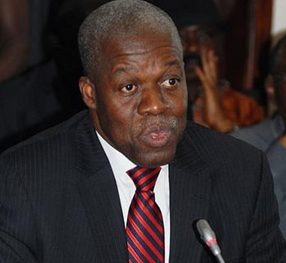 |
| Kwesi Amissah-Arthur – Vice-President |
He said under the plan output of fish farms were projected to increase from 19,000 tonnes in 2011 to 100,000 tonnes by 2017.
Vice President Amissah-Arthur made the statement when he laid the foundation stone for the Anomabo Fisheries College at Buranamua near Anomabo in the Central Region of Ghana.
The college, which would operate as a satellite campus of the University of Cape Coast (UCC), is named after late Professor John Evans Atta-Mills in fulfilment of his campaign promise he made to operators in the fisheries industry.
The purpose of the fisheries college is to train middle level as well as professional class of people to drive the transformation agenda of modernising Ghana’s fisheries.
In addition, the college is to provide avenue for the training of artisan fishermen, fishmongers and fish farmers in the application of science and technology in their chosen fields.The first batch of students are expected to enroll at the college on October next year.
Vice President Amissah-Arthur also stated that the establishment of the fisheries college re-enforces government’s commitment to modernising agriculture especially the fisheries sub-sector.
Through in-service training and other programmes graduates from the college would constitute the force that would launch Ghana into the new era, he said.
He said in the medium term graduates from the college are expected to utilise the new approaches to aquaculture and increase the supply of fish at lower prices.
Vice President Amissah-Arthur said in many countries the decline in landed fish catch have been addressed by increasing the yield from fish farms, adding that in some countries output from aquaculture have outstrip the catch from the sea.
In addition, he said that in Ghana however aquaculture contribute less than one per cent of the annual fish production and fish catch from the sea remain.
Since 2012 the government has distributed Global Positioning System base technology fish finders to many fishermen free of charge, he added.
He said the aim of this initiative is to help the fishermen to easily locate fish in the sea and to stop unorthodox means of fishing.
Ms Sherry Ayittey, Minister of Fisheries and Aquaculture Development said government’s commitment to the fisheries college is a fundamental component of its policy response to achieving a long term sustainable fisheries sector in Ghana through capacity building human resource development.
She said education in the fishing industry is vital to the industry’s future success, adding that ensuring that people understand the value, quality and importance of Ghana’s fishing is fundamental to securing their support for the industry.
Ms Ayittey said, “We live in a globalised world where fisheries management and expertise continue to increase in complexity, and fisheries professionals are more frequently being called upon to function in new settings.”
The goal of the college is to build capacity in the fisheries sector through vigorous research activities and training of extension staff and practitioners for efficient and sustainable management of the marine and inland fisheries resources, Ms Ayittey added.
She said the trained officers would assist artisan fishermen to adopt improved or modern fishing practices.
Furthermore, she said the college would also run short-term proficiency courses in all aspects of fishers and aquaculture for practitioners and prospective actors.
Professor John Nelson Boah, Pro-Vice Chancellor of UCC said the university has welcomed the opportunity to be associated with the college and to be part of the history. He said the university would work to ensure that the fisheries college becomes a centre of excellence.
Read more HERE.
The Aquaculturists
This blog is maintained by The Aquaculturists staff and is supported by the
magazine International Aquafeed which is published by Perendale Publishers Ltd
For additional daily news from aquaculture around the world: aquaculture-news

No comments:
Post a Comment